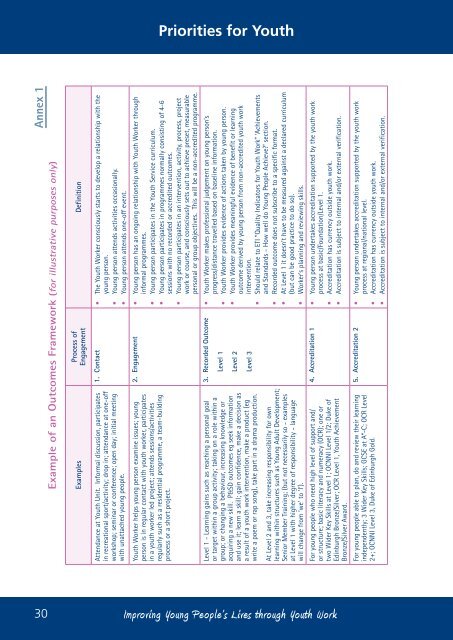Priorities for Youth
1G9j7BLbK
1G9j7BLbK
- No tags were found...
Create successful ePaper yourself
Turn your PDF publications into a flip-book with our unique Google optimized e-Paper software.
<strong>Priorities</strong> <strong>for</strong> <strong>Youth</strong><br />
Example of an Outcomes Framework (<strong>for</strong> illustrative purposes only)<br />
Annex 1<br />
Examples<br />
Process of<br />
Engagement<br />
Definition<br />
Attendance at <strong>Youth</strong> Unit. In<strong>for</strong>mal discussion, participates<br />
in recreational sport/activity; drop in; attendance at one-off<br />
workshop; seminar or conference; open day; initial meeting<br />
with unattached young people.<br />
<strong>Youth</strong> Worker helps young person examine issues; young<br />
person is in regular contact with youth worker, participates<br />
in a youth worker led project; attends sessions/activities<br />
regularly such as a residential programme, a team-building<br />
process or a short project.<br />
Level 1 - Learning gains such as reaching a personal goal<br />
or target within a group activity; taking on a role within a<br />
group; or changing a behaviour, increasing knowledge or<br />
acquiring a new skill. P&SD outcomes eg seek in<strong>for</strong>mation<br />
and use it; learn a skill; gain confidence, make a decision as<br />
a result of a youth work intervention, make a product (eg<br />
write a poem or rap song), take part in a drama production.<br />
At Level 2 and 3, take increasing responsibility <strong>for</strong> own<br />
learning within structures such as Young Adult Development;<br />
Senior Member Training; (but not necessarily so - examples<br />
at Level 1 with higher degree of responsibility - language<br />
will change from ‘we’ to ‘I’).<br />
For young people who need high level of support and/<br />
or structure; basic literacy and numeracy (OCR); one or<br />
two Wider Key Skills at Level 1; OCNNI Level 1/2; Duke of<br />
Edinburgh Bronze/Silver; OCR Level 1, <strong>Youth</strong> Achievement<br />
Bronze/Silver Award.<br />
For young people able to plan, do and review their learning<br />
independently; 3 Wider Key Skills; GCSE at A*-C; OCR Level<br />
2+; OCNNI Level 3, Duke of Edinburgh Gold.<br />
1. Contact • The <strong>Youth</strong> Worker consciously starts to develop a relationship with the<br />
young person.<br />
• Young person attends activities occasionally.<br />
• Young person attends one-off event.<br />
2. Engagement • Young person has an ongoing relationship with <strong>Youth</strong> Worker through<br />
in<strong>for</strong>mal programmes.<br />
• Young person participates in the <strong>Youth</strong> Service curriculum.<br />
• Young person participates in programmes normally consisting of 4-6<br />
sessions with no recorded or accredited outcomes.<br />
• Young person participates in an intervention, activity, process, project<br />
work or course, and consciously sets out to achieve preset, measurable<br />
personal or group objectives. This will be a non-accredited programme.<br />
3. Recorded Outcome<br />
Level 1<br />
Level 2<br />
Level 3<br />
• <strong>Youth</strong> Worker makes professional judgement on young person’s<br />
progress/distance travelled based on baseline in<strong>for</strong>mation.<br />
• <strong>Youth</strong> Worker provides evidence of actions taken by young person.<br />
• <strong>Youth</strong> Worker provides meaningful evidence of benefit or learning<br />
outcome derived by young person from non-accredited youth work<br />
intervention.<br />
• Should relate to ETI “Quality Indicators <strong>for</strong> <strong>Youth</strong> Work” ‘Achievements<br />
and Standards - How well do Young People Achieve?’ section.<br />
• Recorded outcome does not subscribe to a specific <strong>for</strong>mat.<br />
• At Level 1 it doesn’t have to be measured against a declared curriculum<br />
(but can be good practice to do so).<br />
• Worker’s planning and reviewing skills.<br />
4. Accreditation 1 • Young person undertakes accreditation supported by the youth work<br />
process at basic/Foundation/Level 1.<br />
• Accreditation has currency outside youth work.<br />
• Accreditation is subject to internal and/or external verification.<br />
5. Accreditation 2 • Young person undertakes accreditation supported by the youth work<br />
process at regional/national level.<br />
• Accreditation has currency outside youth work.<br />
• Accreditation is subject to internal and/or external verification.<br />
30 Improving Young People’s Lives through <strong>Youth</strong> Work


